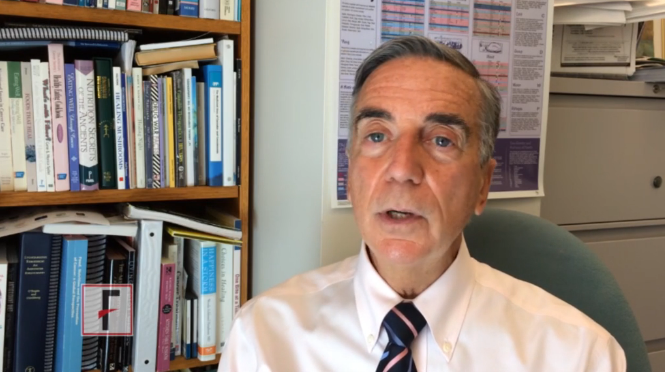User login
SAN FRANCISCO – Integrative oncology gained a solid foothold in mainstream oncology in the past decade, but it still has a long climb ahead before it’s available and accepted everywhere, Dr. Donald I. Abrams says.
Dr. Abrams gives an in-depth overview of the strengths and weaknesses of integrative oncology in this video interview, including common misconceptions among conventional oncologists and his own take on controversial topics like antioxidants.
He coedited with Dr. Andrew T. Weil the second edition of the textbook "Integrative Oncology" (2014, Oxford University Press). Dr. Abrams is chief of hematology/oncology at San Francisco General Hospital and director of the Integrative Oncology Research Program at the Osher Center for Integrative Medicine, San Francisco. Dr. Weil is director of the Center for Integrative Medicine at the University of Arizona, Tucson.
Dr. Abrams also gives tips on specific topics in integrative oncology including nutrition, botanical therapies, mushrooms, cannabis, and more.
The number of studies in integrative oncology is increasing, but difficulties in designing trials of these management tools limit their findings, he says.
One of Dr. Abrams’ patients, Manuchehr Shirmohamadi, describes how integrative oncology helped him get through treatment for colon cancer.
Dr. Abrams reported having no financial disclosures.
On Twitter @sherryboschert
The video associated with this article is no longer available on this site. Please view all of our videos on the MDedge YouTube channel
SAN FRANCISCO – Integrative oncology gained a solid foothold in mainstream oncology in the past decade, but it still has a long climb ahead before it’s available and accepted everywhere, Dr. Donald I. Abrams says.
Dr. Abrams gives an in-depth overview of the strengths and weaknesses of integrative oncology in this video interview, including common misconceptions among conventional oncologists and his own take on controversial topics like antioxidants.
He coedited with Dr. Andrew T. Weil the second edition of the textbook "Integrative Oncology" (2014, Oxford University Press). Dr. Abrams is chief of hematology/oncology at San Francisco General Hospital and director of the Integrative Oncology Research Program at the Osher Center for Integrative Medicine, San Francisco. Dr. Weil is director of the Center for Integrative Medicine at the University of Arizona, Tucson.
Dr. Abrams also gives tips on specific topics in integrative oncology including nutrition, botanical therapies, mushrooms, cannabis, and more.
The number of studies in integrative oncology is increasing, but difficulties in designing trials of these management tools limit their findings, he says.
One of Dr. Abrams’ patients, Manuchehr Shirmohamadi, describes how integrative oncology helped him get through treatment for colon cancer.
Dr. Abrams reported having no financial disclosures.
On Twitter @sherryboschert
The video associated with this article is no longer available on this site. Please view all of our videos on the MDedge YouTube channel
SAN FRANCISCO – Integrative oncology gained a solid foothold in mainstream oncology in the past decade, but it still has a long climb ahead before it’s available and accepted everywhere, Dr. Donald I. Abrams says.
Dr. Abrams gives an in-depth overview of the strengths and weaknesses of integrative oncology in this video interview, including common misconceptions among conventional oncologists and his own take on controversial topics like antioxidants.
He coedited with Dr. Andrew T. Weil the second edition of the textbook "Integrative Oncology" (2014, Oxford University Press). Dr. Abrams is chief of hematology/oncology at San Francisco General Hospital and director of the Integrative Oncology Research Program at the Osher Center for Integrative Medicine, San Francisco. Dr. Weil is director of the Center for Integrative Medicine at the University of Arizona, Tucson.
Dr. Abrams also gives tips on specific topics in integrative oncology including nutrition, botanical therapies, mushrooms, cannabis, and more.
The number of studies in integrative oncology is increasing, but difficulties in designing trials of these management tools limit their findings, he says.
One of Dr. Abrams’ patients, Manuchehr Shirmohamadi, describes how integrative oncology helped him get through treatment for colon cancer.
Dr. Abrams reported having no financial disclosures.
On Twitter @sherryboschert
